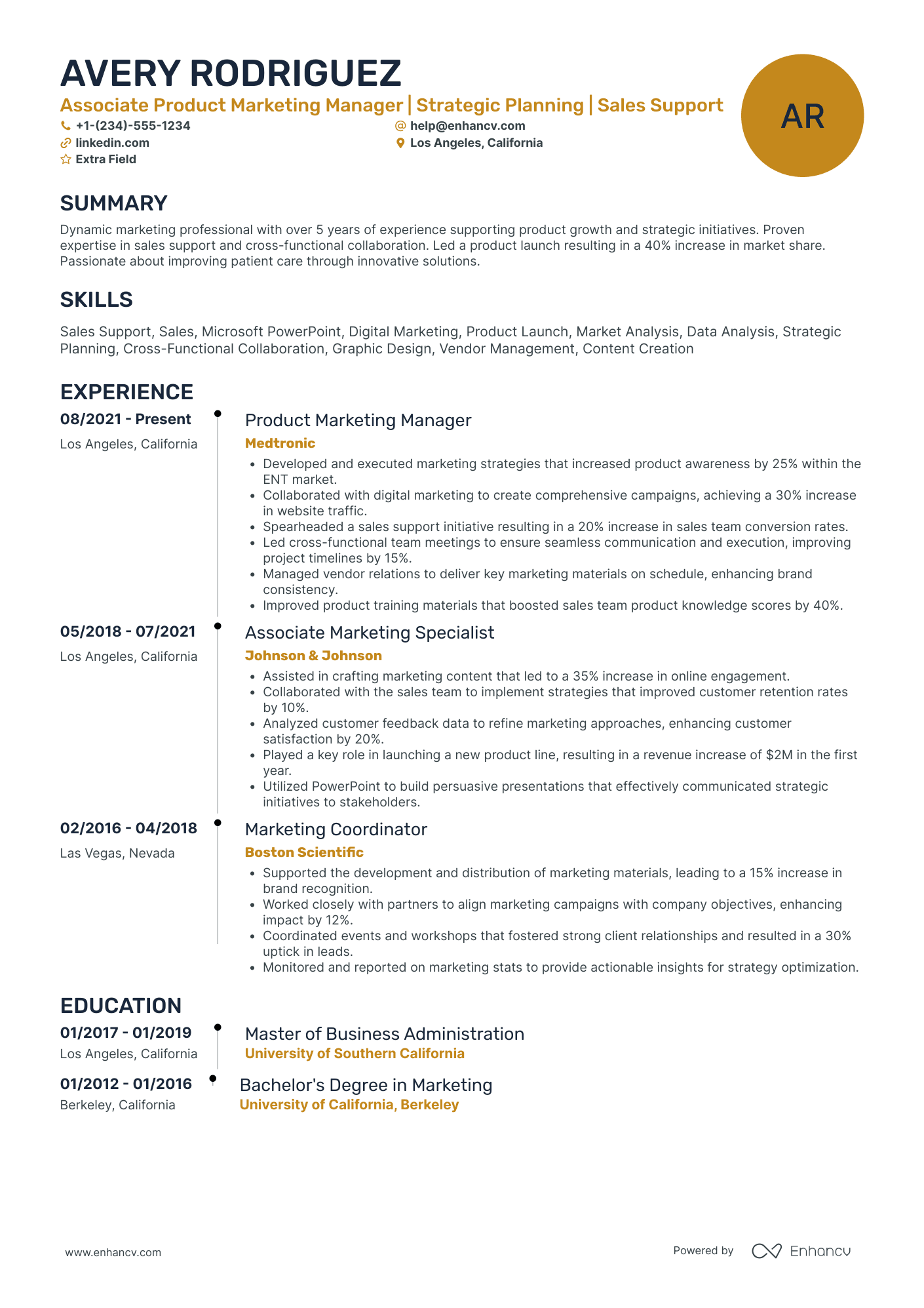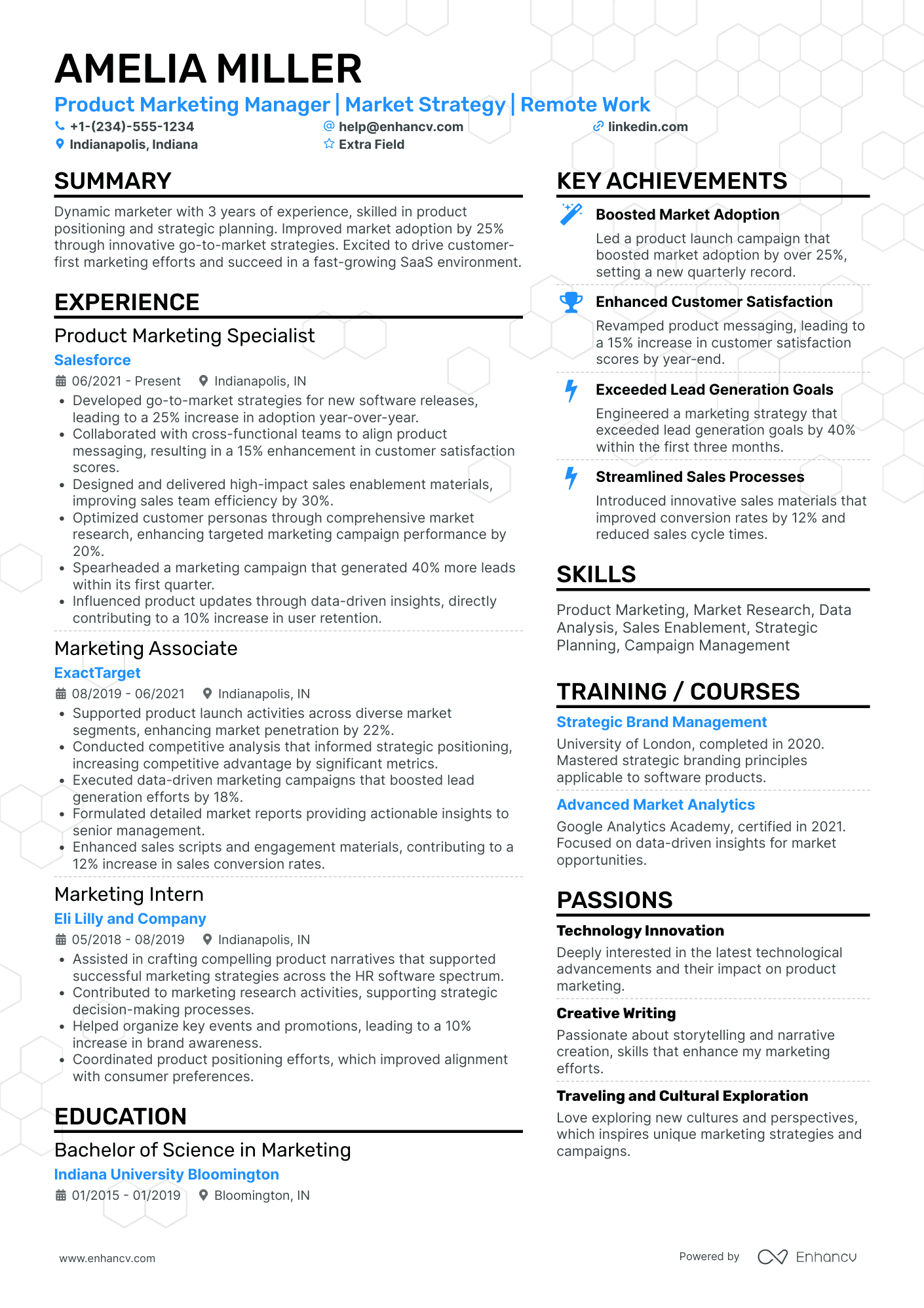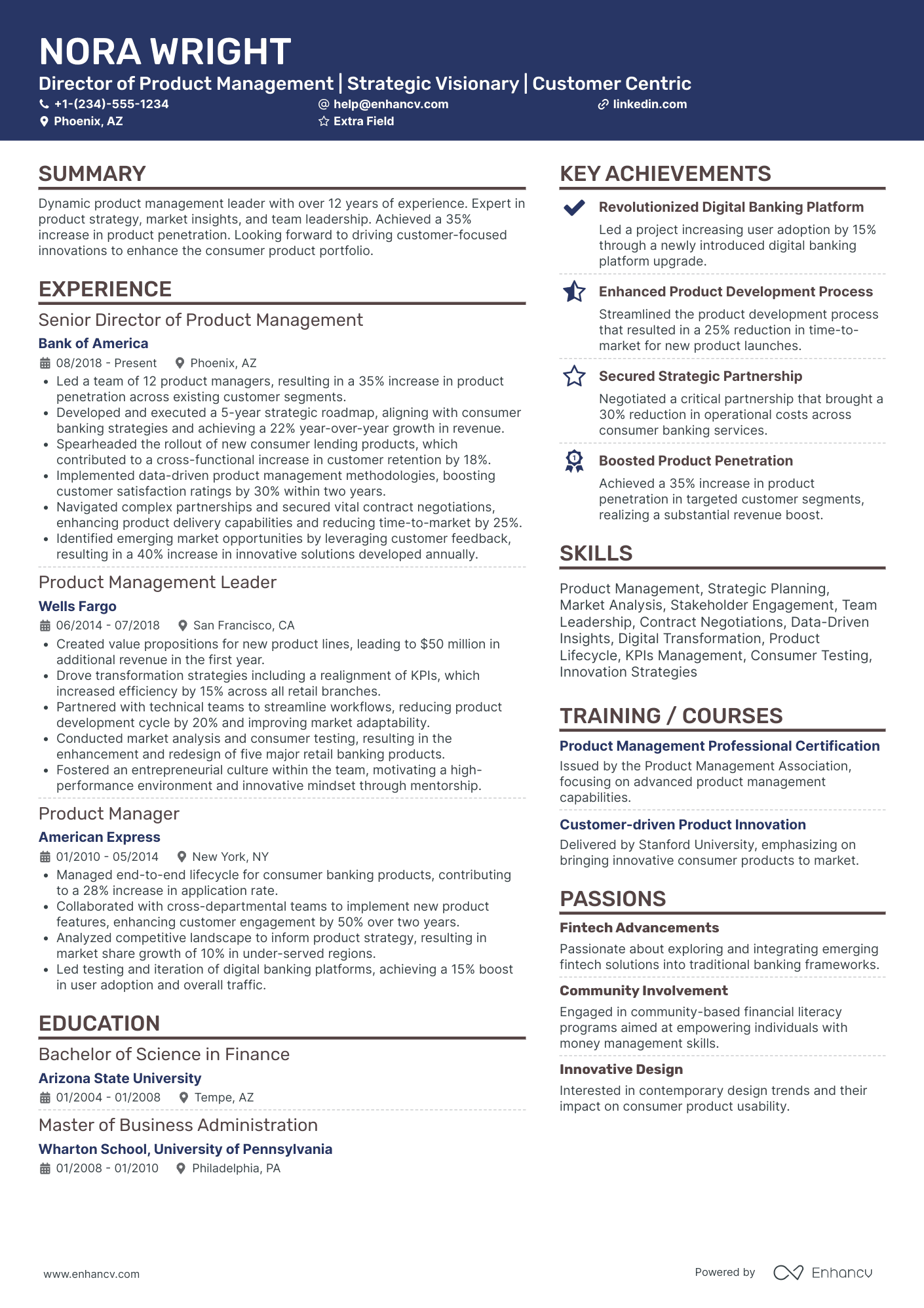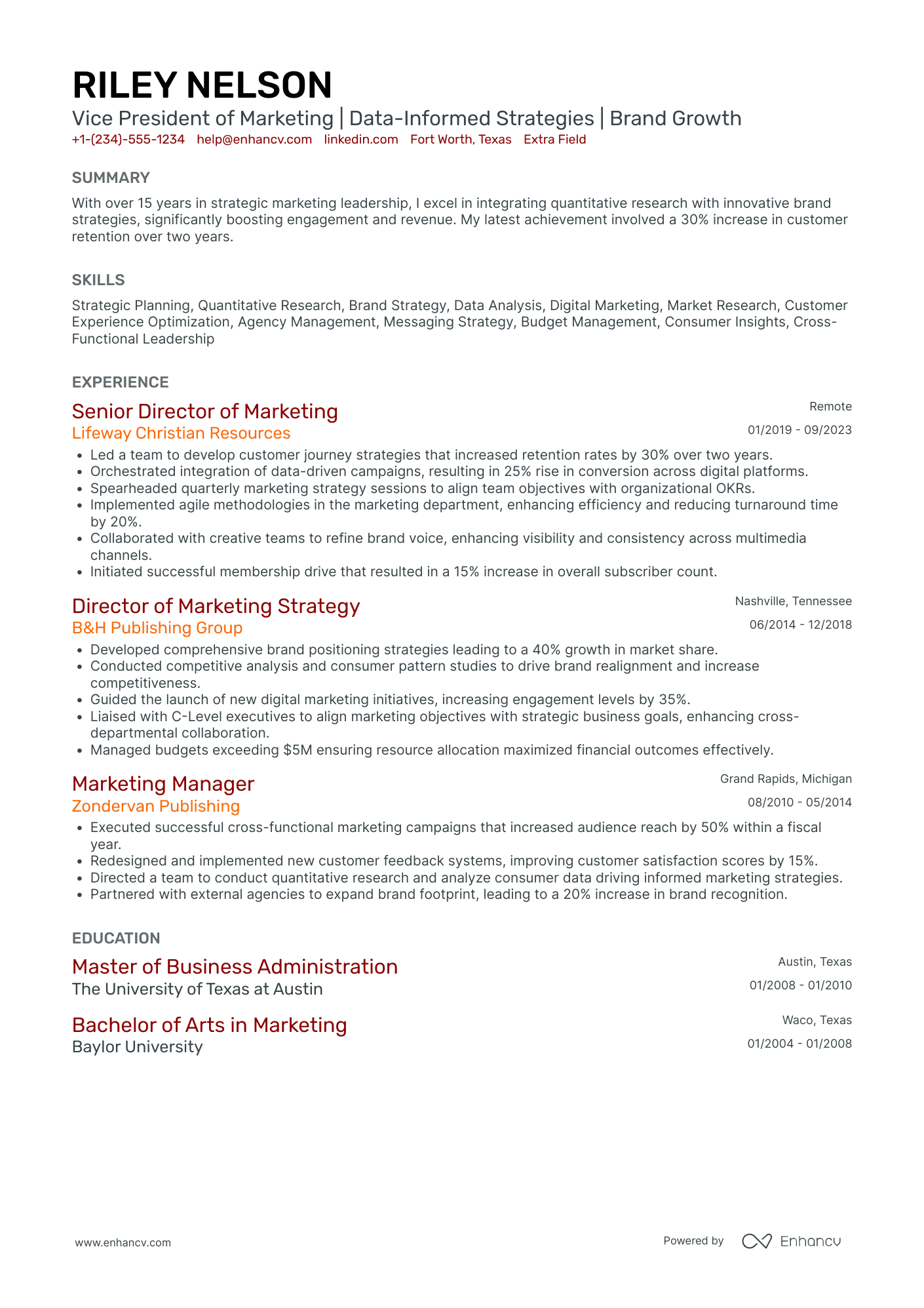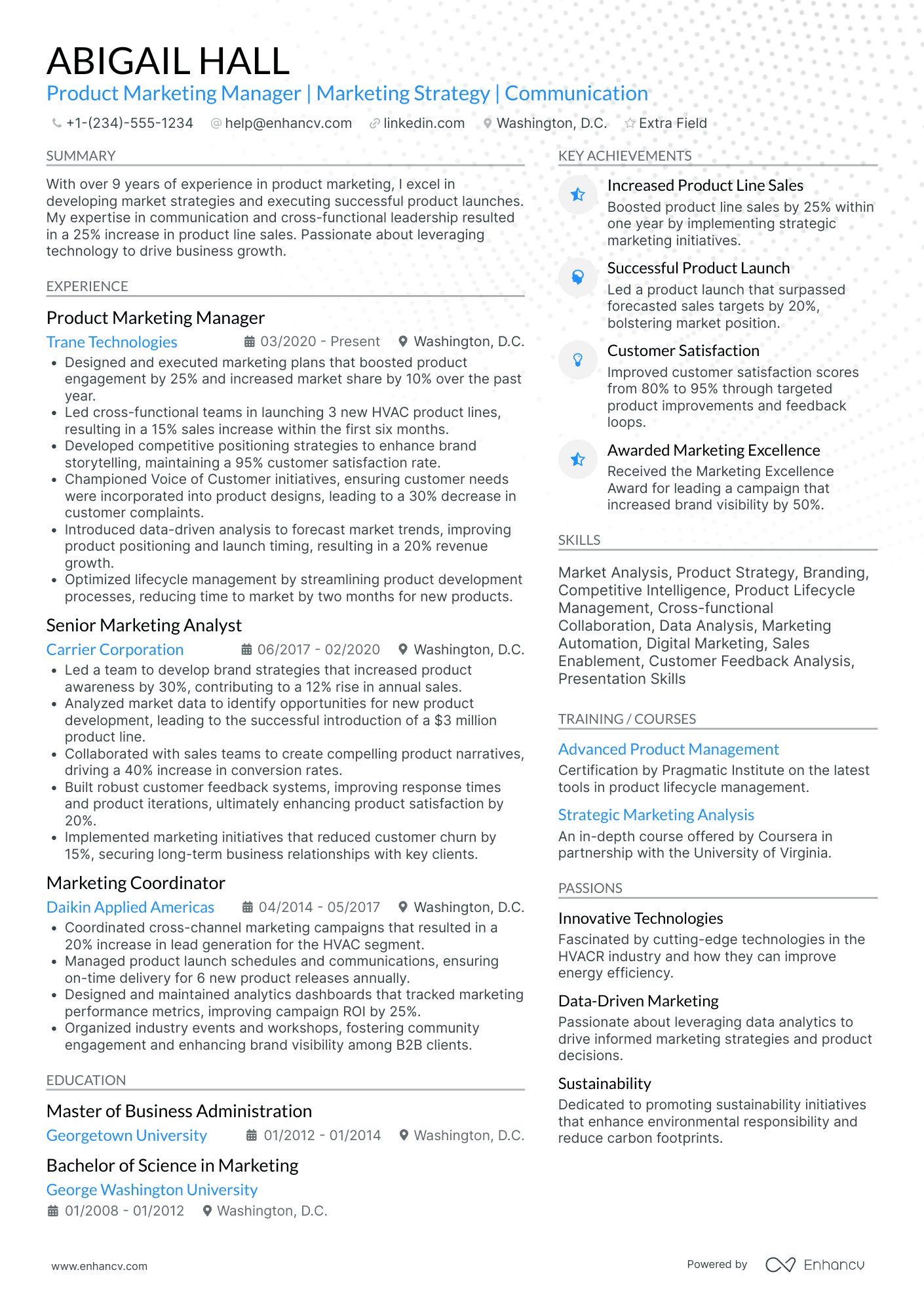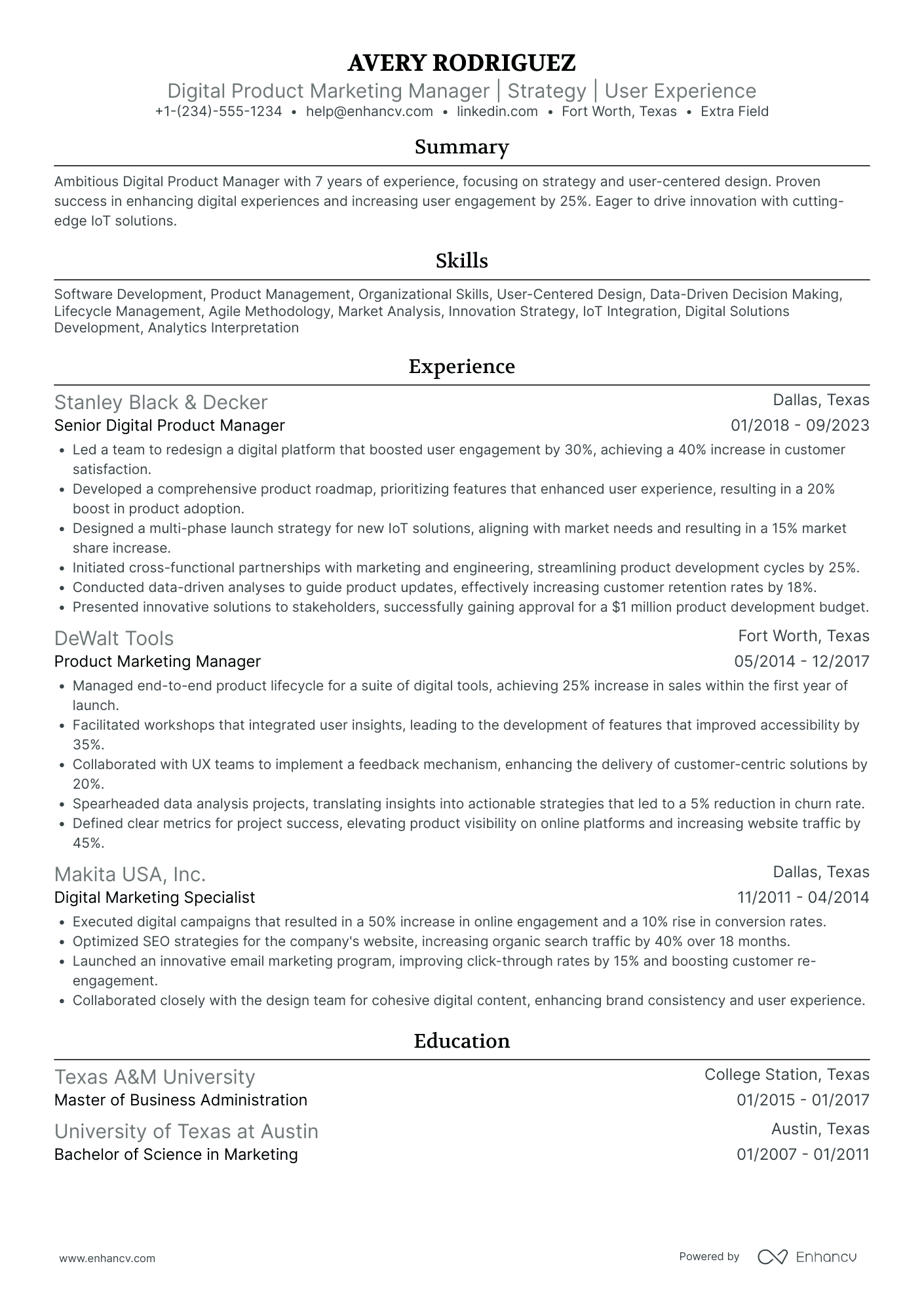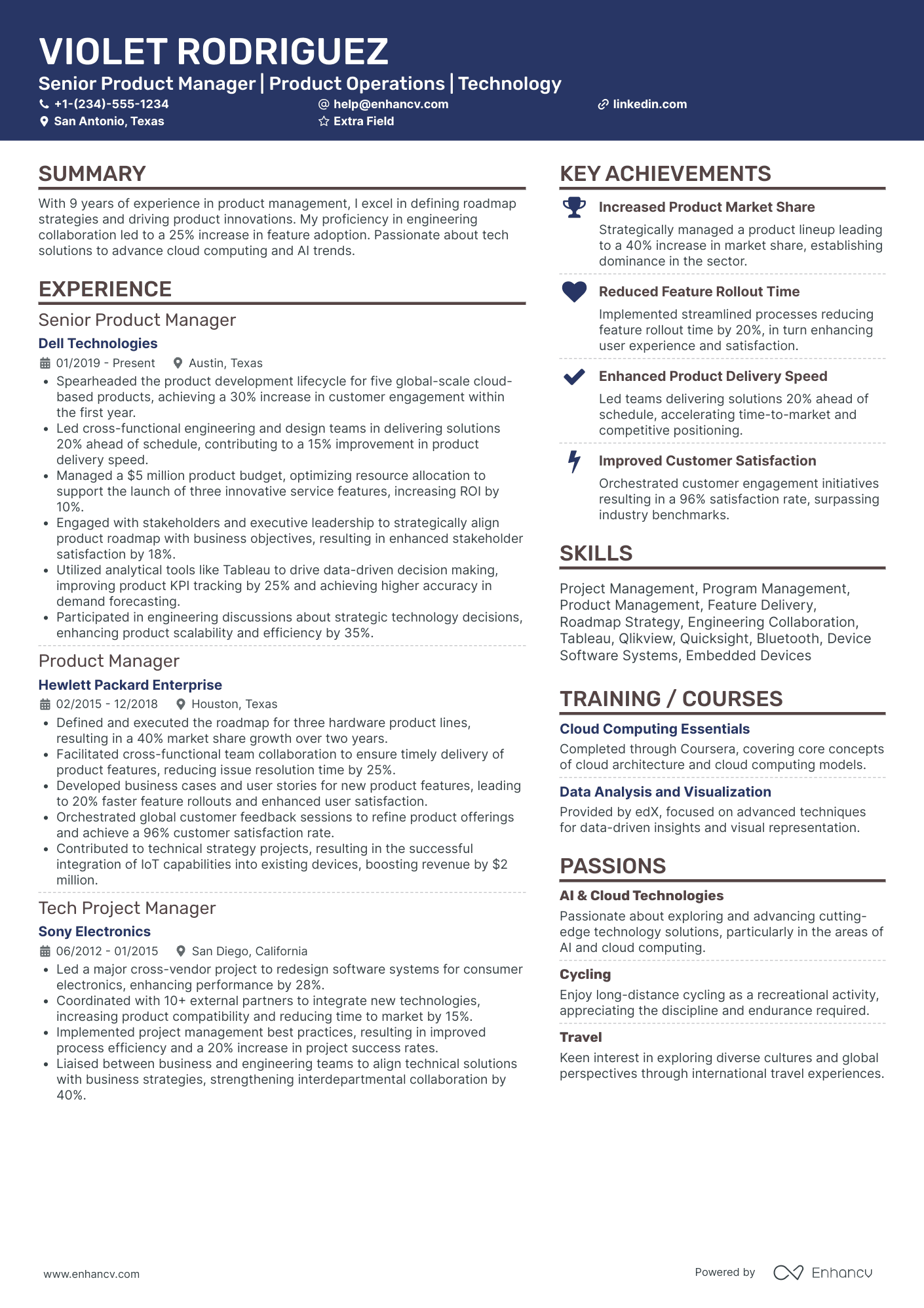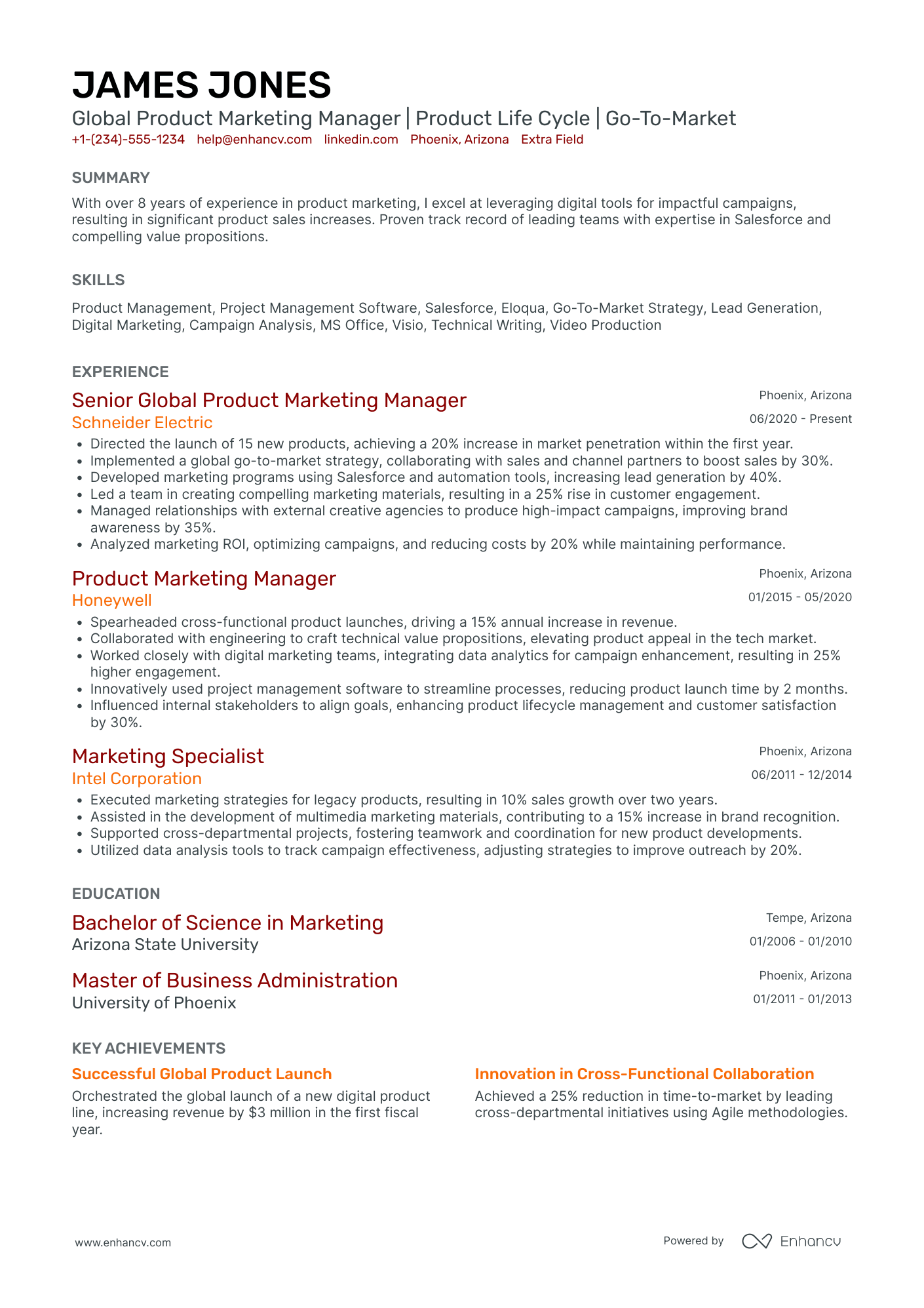Product marketing solves the “Field of Dreams” issue for B2B companies.
“If we build it, they will come.”
That’s where a product marketing manager comes in. To make sure customers are aware of the “latest and greatest.”
It’s an extremely hot and exciting playing field, as you’re batting for sales, marketing & product teams. But the pressure is on, as you must hit a home run every time.
But without an “all-star” product marketing manager resume, you won’t even get out of the dugout.
Your big win starts with the hiring manager.
So your product marketing manager resume must light up the scoreboard to outpace your competitors for the position.
Being a product marketing manager is all about messaging. You need to understand what the customer wants and translate all of the techno-speak into customer-friendly language.
Just make the hiring manager your customer and show off your skills in:
- GTM launch campaigns
- Product launches
- Sales enablement
- Cross-functional team leadership
Getting interviews will require you to bring your “A game.”
And this guide will help you do just that.
A priority for many companies is using data to deliver personalized experiences throughout the customer journey. Finding people with experience in this area is a challenge, as they're in high demand and short supply.
Diane Domeyer, Executive Director, The Creative Group
This product marketing manager resume guide will give:
- 8+ product marketing manager resume examples that highlight goals, experience, and background
- The technical and soft skills you need to mention throughout your resume
- How to showcase your marketing experience to make the hiring manager take notice
- The importance of integrating specific keywords from the job description in your resume
- The right way to list your education and certifications on your resume
- An incredible product marketing manager resume that will have recruiters lined up to interview you
How to write a product marketing manager resume
Your primary goal as a product marketing manager is to create demand for products through effective messaging and marketing programs.
Your resume should be no different, other than making you; the product that you’re trying to sell.
Product marketing managers live in three worlds—customers, products, and marketing.
You need to bring them together.
A product marketing manager needs to show a wide range of skills and a broad set of business and marketing experience.
You’ll need the recruiter to see:
- Demonstrated success in positioning and launching products
- Excellent written and verbal communication skills
- Subject matter expertise for the product or market, including specific industry or technical knowledge
- Deep understanding of how a product is sold and the channels they are sold into
- Excellent teamwork skills
- Proven ability to influence cross-functional teams from sales, marketing, and product development
These skill areas should be mentioned throughout your resume.
A recruiter wants to see in your resume how you:
- Developed and evolved market segmentation for different product offerings
- Analyzed market data to improve product interest and sales
- Created consistent positioning statements, messaging, and proof points
- Write compelling copy for different audiences and mediums
- Created and presented information about products and markets
- Explained the customer-led benefits of the product to virtually any audience
The most important sections of a product marketing manager resume:
- Detailed resume header
- Resume summary
- Resume experience
- Technical and soft skills
- Education and certifications
Your resume requires you to highlight your benefits and explain your value to recruiters and hiring managers.
This guide has all of the steps you need to make your resume stand out and outstanding.
For more information on the best resume formats, read our guide: The Best Resume Formats You Need to Consider (5+ Examples Included).
Product marketing manager resume header: how important is it?
One key area for a product marketing manager is focusing on brand perception. After all, to the consumer, perception is reality.
That is why you shouldn’t be too basic when it comes to your resume header:
When marketing yourself, you shouldn’t go against your brand perception. If you’re trying to showcase yourself, you can’t speak softly.
You need to connect with your target audience—the hiring manager—in a way that resonates and sells your professional worth:
You need to let the hiring managers know immediately that you’re not someone who settles for the basics. That’s why it’s critical to make your resume start out different and confident.
The importance of social media for a product marketing manager resume
Including your LinkedIn profile in your header gives you an additional self-promotion outlet.
LinkedIn allows you to expand on your previous marketing experience as much as you want.
It also lets you show the company how active you are on an important B2B social media platform. And, depending on the position, social and digital marketing may be crucial.
Before you give a link to your profile, you’ll want to make it amazing. Here are some tips:
- Use a professional headshot (and not the picture from your friend’s wedding)
- Create an eye-catching headline
- Write a comprehensive and interesting summary
- Highlight all of your previous experience, including all paid and non-paid positions
- Use or share plenty of visual media, like viral videos and infographics
- Customize your URL
- Make plenty of connections, from colleagues to respected industry leaders
- Ask for recommendations from your connections
- Keep your profile active with plenty of posts, shares, and groups
LinkedIn is your chance to get your story out there to hundreds or thousands of professionals. That self-marketing is essential, especially if you're looking for a job.
If you want more ideas for stand-out resume headers, read through our guide Perfecting Your Resume Header so You Get Noticed.
Product marketing manager summary: how to tell your story
Your product marketing manager resume needs to bring all of your skills, experience, and expertise to the table.
But you shouldn’t do it all at once in the summary. No need to drown the hiring manager in a sea of data.
A compelling professional summary should feature strong descriptive words to showcase yourself as a worthy candidate.
You need to pique the interest of the hiring managers with brief, specific examples of expertise and skills. These will prove that you’re a serious applicant.
Lean on your quantitative data and job posting keywords to construct a powerful statement.
Here’s an example of what to avoid:
Do you think that will interest the hiring manager? The most likely reaction is “meh,” followed by the resume ending up in the reject pile.
Here’s why that summary didn’t work:
- An “I” statement is not a strong opening statement. It is too self-serving.
- The marketing experience is not specific. What did you market? Products? Causes? Cute puppies?
- There are no KPIs shown. Only broad/vague statements.
- There are no specific skills listed from the job posting
Here’s a better way to write your summary:
This summary gets right to the point. You have the experience needed for the role, and you back up those claims with actionable verbs and specific skills.
Pro tip
Make sure your summary provides a preview for your experience section. Your summary should be a teaser for what the hiring manager will see below. If you say you improved sales, be sure you give the empirical data in a specific job section.
For more tips on crafting an attention-grabbing resume summary, check out our guide Resume Summary: How-To Guide (30+ Examples You Need To See). If you’re looking to craft a compelling resume objective instead, read our writing tips at 10 Resume Objective Examples You Need to Steal (How-to-Guide).
Optimize your resume summary and objective for ATS
Drop your resume here or choose a file.
PDF & DOCX only. Max 2MB file size.
Product marketing manager resume experience: the best way to frame it
To get people to buy a product, you have to create trust in the consumer.
The same principle applies to writing your product marketing manager resume.
Make the hiring manager trust that you’re the best person for the job.
This can be done in two ways:
- Depth of experience
- Data-driven results.
A product marketing manager is at the forefront “behind the scenes.”
You’ll need to collaborate with multiple disciplines, from engineering to creative teams.
To bring a product from concept to commercialization, you have to be involved in things like pricing, strategy, market analysis, branding, and messaging.
All of those diverse types of experience need to be shown in your experience section. The well-rounded candidate has the best chance of being selected.
But all that experience doesn’t matter if you don’t show results. Product marketing is all about sales and market penetration. Those are best measured in dollars and percentages, so you should have plenty of both in your bullets.
Next, we will compare some product marketing resume experience examples to show what shines and what doesn’t impress the hiring manager.
You need to focus on the outcomes, not the outputs, when listing your product marketing background. If you’re finding it difficult to communicate your experience, break down each past role like this:
- What was the company’s sales goal?
- What marketing skills did you employ to help meet those goals?
- What were the measurable results of your work?
- What types of teams did you work with to achieve your goals?
Sometimes, in trying to keep things brief, you can skip over your accomplishments and sell yourself short. For example:
- •Developed, directed and measured the execution of strategic annual/long-term marketing plans in order to meet and exceed sales and revenue commitments/goals
- •Led corporate staff to meet sales, training, and business presentation targets and to maintain good interpersonal relations with customers and fellow colleagues
- •Constructed work plans, established marketing strategy and conducted forecasts, budget management and control – all within set deadlines.
It’s not to say that experience isn’t good, but there is no data, no results, and no strategy shown. That makes the employee seem like they just went through the motions.
Whether you’ve launched products, created effective marketing material, or managed a team of marketing dynamos, you’ll need to demonstrate some hard data that shows you’ve been a success.
- •Directed launch of 12 new product lines with total annual revenue of $1.2 billion
- •Managed all corporate marketing functions with budget of $2M, including brand management, product launch, advertising, marketing collateral, and events
- •Established new social media team including Content Developers, SEO Specialists, and Media Technicians that grew company’s web presence and global brand awareness by 34%
- •Recruited, hired, and trained over 30 marketing and sales specialists, improving overall sales targets by 24% while maintaining 86% in employee retention
Adding this type of hard data will go a long way in landing you at the top of the interview pile. This experience section shows depth of experience and a wealth of tangible results.
How best to promote your product marketing experience on your resume
There are several specific skill areas you’ll need to highlight to be considered for a role that spans across multiple teams to create customer interest:
- Deep empathy for customers and passion for solving their issues.
- How to work with and align sales, marketing and product teams and lead each group toward a common goal.
- Technical skills for effective communication between product teams.
- Ability to communicate the benefits of complex features and updates and make them easy for customers to understand.
- A knack for navigating unstructured environments to find and act on opportunities to improve the customer experience.
- Both creative and analytical skills to connect data points from a number of sources and come up with out-of-the-box solutions that customers need and respond to.
Capitalizing on these areas will go a long way toward getting you noticed and interviewed by the hiring manager.
For more ideas on how to create an actionable resume experience section, check out our guide How to Describe Your Resume Work Experience.
Why your product marketing manager resume needs an education section
Hiring managers are keen to interview product marketing manager candidates that have a strong educational background.
You need a minimum of a bachelor’s degree in marketing or a related field to pursue a career as a product marketing manager. An advanced degree, like a master’s degree or MBA, can give you a competitive edge.
Coursework or experience in business, economics, and management is also preferable.
If you have a wealth of work experience, the education section can be brief. Brevity doesn’t make it a weak aspect of the resume. Most hiring managers expect this to be a short section, as long as it includes important qualifications.
Browse more essential tips on how to feature education on your resume, in our guide Perfecting the Education Section on Your Resume.
Which skills do employers look for in a product marketing resume?
The responsibility of a product marketing manager can be very broad. That means the value to an organization can be very significant.
You’ll need to integrate both your soft skills and your technical skills to keep the hiring manager’s interest.
At the heart of product marketing is the ability to understand the magic of the product, understand the customer, and connect the two. The best product marketers understand how to distill the value of their product to its most essential form.
Jeff Gadway, Co-founder at Galvanize Worldwide
8 soft skills to include on a product marketing manager resume
- Leadership
- Problem solving
- Teamwork
- Attention to detail
- Creativity
- Analytical skills
- Communication
- Empathy
Remember, you can’t just list skills and hope they resonate with the hiring manager. You need to demonstrate how you’ve displayed your skills in your marketing work.
Craft a sentence for each skill that describes how you used that skill in your professional background.
Resumes are also a great place to incorporate keywords that are pertinent to the job posting.
25 Technical Skill Keywords to Include on a product marketing manager Resume
- Market research
- Segmentation
- Targeting
- Surveys
- Interviews
- Competitive analysis
- Customer needs
- Pain points
- Customer feedback
- Cross-functional
- Insights
- Roadmap
- Voice of the customer
- Marketing strategy
- Branding
- Messaging
- Go-to-market (GTM) plan
- Positioning
- Value proposition
- Channels
- Marketing campaigns
- Content marketing
- Collateral
- Digital media
- Case studies
Are you still not sure what skills will win recruiters over? Check out our guide on How to Create A Resume Skills Section To Impress Recruiters (+10 Examples You Need to See).
Why include your certifications on your product marketing manager resume?
Certification can display knowledge in research, analysis, and evaluation of marketing trends and data. This demonstrates that you know how to use data analysis to create successful marketing opportunities.
Some common certifications include:
- Association of International Product Marketing and Management (AIPMM)
- Certified product marketing manager (CPMM)
- Project Management Professional (PMP)
- Certified Trade Show Marketer (CTSM)
- Google AdWords
- Google Analytics
Always list required or desired certifications from the job description first before adding other certifications you may have.
For more information on how to properly list resume certifications, we recommend reading our guide How To List Certifications On A Resume (Examples Included).
Other sections to include on your resume
Depending on the company, job seniority level and your location, you may want to include more sections to your product marketing manager resume:
- Language skills
- Hobbies and interests
- Projects
- Volunteer work
- Highlights
- References
- LinkedIn on Resume
- GPA
Project marketing manager resume: gotchas and takeaways
- Showcase your unique background and qualifications
- Back up each section with tangible data that demonstrates success
- Tailor your education, skills, and experience to the most relevant items
- Include keywords from the job posting and the industry throughout your resume
- Ensure each section creates a clear understanding of your upward career growth
Product Marketing Manager resume examples
By Experience
By Role
